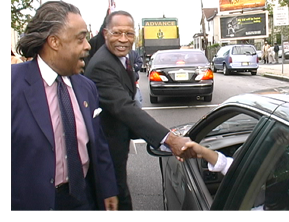 Frequently Asked Questions
Frequently Asked QuestionsBelow are questions and answers with the director of Street Fight, Marshall Curry.
Q: How did you become interested in this story?
MC: I first got to know Newark when I took time off from college
to set up a literacy program there. It's an amazing city with people
who are tough and warm and who tell you what they think, which is great
if you are making documentary films. At that point I really had a positive
opinion of the Mayor, Sharpe James, and I considered him a funny and
charismatic reformer who was going to bring a renaissance to Newark.
Years later, my brother, who raises money for a lot of Democrats, began hitting me up for a donation to this young guy, Cory Booker, who was running for mayor of Newark. He kept talking about how Cory was going to be the first black President of America which seemed a bit excessive to me, since Cory was just 32 and had only won one election-- as a city councilman.
But I went to a fundraiser and met Cory, and thought-- wow. He's smart
and charismatic and idealistic-- and an interesting combination of policy
wonk on one hand and 60s style activist on the other. I didn't know
what was going to happen when these two men got into a ring together,
but with two characters as colorful and complicated as they were, I
knew it would be interesting. So I bought a camera and a few days later
started shooting.
Q: What are Cory and Sharpe doing now?
MC: (Spoiler Alert: If you haven't seen the film yet, you might want to skip this one-- it gives away the ending...)
Cory had to give up his city council seat when he ran for mayor, so he spent the following few years working as a lawyer in Newark. He also founded a non-profit called Newark Now, and, of course, continued running for mayor-- raising money, going door-to-door, assembling a campaign team and setting up offices.
Most people expected the next election to be a rematch of the 2002 race, but as Election Day approached, Sharpe James still had not formally declared his intention to run.
On March 16th, 2006, hours before the deadline to file petitions to get on the ballot and less than two months before election day, a very fit James (see below) showed up at City Hall in a tank top and straw hat. He rode a lap around the hallways of the building on a Newark Police bicycle and delivered the signatures to the city clerk. It was classic Sharpe James-- outlandish and puzzling to his opponents, and humorously eccentric to his supporters.

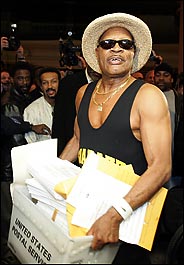
The Star Ledger did an interesting review of the petitions, showing that they were full of duplications, but 11 days later, none of that mattered. Sharpe James suddenly dropped out of the race.
No one knows for sure why the mayor dropped out, but most people think that his campaign's poll numbers showed that he was trailing Booker, and he preferred to retire as the undefeated champ rather than risk a defeat. In the preceding months, Booker had raised millions of dollars for his campaign and had won the support of much of the political establishment that had backed James in the previous election, including the SEIU and the police union as well as many state and county officials.
James endorsed State Senator, Ron Rice Sr. to run against Booker, but on Election Day, May 9th, 2006, Booker won every ward in Newark and was elected mayor with 72% of the vote-- the biggest landslide in Newark history. In addition, Booker's slate of city council candidates won every council seat in the city.
On Election Day, I was filming in the city and bumped into Sharpe James who was out campaigning for his son, a candidate for city council (who lost). The mayor recognized me, and his security guard -- a NPD detective – tried to make me stop filming. I guess some things never change...
(BTW- here's an interesting resource with info on photographers' right to take photos in public. http://www.krages.com/bpkphoto.htm.)
After the election, the Booker administration began auditing the city’s books and discovered problems that they passed on to state and federal investigators. The investigation that followed resulted in Sharpe James being convicted in Federal Court for corruption and sentenced to twenty-seven months in prison. (He was released in April 2012 after serving 19 months.)
Booker was reelected in 2010, but three years into his term, N.J.’s US Senator, Frank Lautenberg, died in office, leaving open a vacant seat. In a special election in 2013, Booker ran for the open seat and defeated his Republican opponent. In 2014, he had to run again – this time in the normally scheduled election – and again he won.
Today he is one of the US Senators from New Jersey.
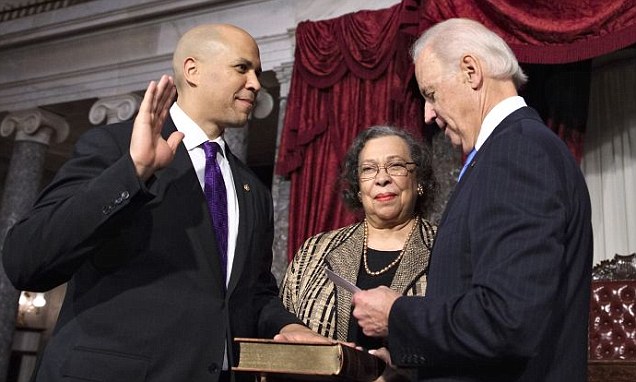
Q: What size crew did you have; what kind of equipment did you use;
how much footage did you shoot?
MC: I shot the film on a Sony PD-150 and usually shot alone. It
wasn't easy-- I was shooting, doing sound, lugging my gear around, driving
the car, getting release forms. But shooting alone also made it possible
for me to get more intimate footage than I could have if I had a crew
with me. I could jump into the backseat of car or duck into a meeting,
and people didn't pay much attention to me.
There were some days when I had another person working with me, doing sound or a running a second camera. And on election day we had four crews around the city, trying to capture everything that was going on.
Over the five month election, I shot 200 hours of footage (that is
five weeks of 40-hour weeks just to watch it once...) and I edited it
with Final Cut Pro on a Macintosh.
Q: What were the biggest challenges in making the film?
MC: Obviously it was tough shooting in some of the situations where
Sharpe James's police tried to stop me. When I began making the film
it had never occurred to me that I wouldn't be able to spend some time
with the mayor -- do interviews, hang out in his headquarters, ride
around with him a bit on the campaign trail. When I realized that wasn't
going to happen, I thought seriously about quitting the project because
I didn't think you could make a film about an election with only one
character. But I'm stubborn, and I guess I felt that if someone in power
doesn't want you to tell a story this much, maybe it's a story that
needs to be told.
The other main challenge was how to be fair to both candidates without falling into the "he-said/she-said" style of covering a campaign that we see so often. Too often, I think, the media allows itself to become just an amplifier for two campaigns -- "Obama said X; Romney said Y" -- without analyzing whether one side is telling the truth. In their attempt to be fair, they end up giving a less accurate image of what's really going on.
I decided early on in editing that I wanted the film to have a point of view, and that I wasn't going to pretend that these two candidates were ethically equivalent. I think a filmmaker should be like a referee, and a good referee doesn't call the same number of fouls on both sides; a good referee calls fouls when he sees them.
Of course I also wanted the film to be complex -- and fair. I wanted the audience to see Sharpe James' charisma, his accomplishments, and his compelling life story, and I wanted them to understand why some people loved him and didn't like Cory. I also never took words out of context or edited in a misleading way to make anyone look good or bad. In the end I set as my goal to make a film that accurately and honestly depicted what I saw and experienced on the campaign -- and I think that Street Fight achieved that.
(Here's a larger piece I wrote on the difference between being "fair" and "balanced.")
Q: How have Cory Booker and Sharpe James responded to the film?
MC: I think that Cory in general likes it. He had no creative control
over the film, and the first time that he saw it was when it was essentially
done, which was pretty nerve-wracking for both of us, I think. There
were some things that he was unhappy with. He hates the scene, for instance,
where he is arguing with his press secretary in his apartment before
the debate. And there were a number of things that his campaign would
prefer were not in the film (people speaking well of Sharpe James accomplishments,
Cory fundraising in the suburbs and New York City, etc.) But I think
he feels like -- all things considered-- he came across well and accepts that it was
an accurate portrayal of the election.
Sharpe James, on the other hand, refused to say anything to the press
about the film in the lead-up to its broadcast. He assumed, I guess,
that the less he said, the less attention the film would get. On the
day after it was broadcast nationally on PBS, however, an anonymous mailing went around Newark
comparing me to Adolph Hitler.
Sharpe James says that he has never seen the film, but he says that he knows
it is propaganda. No one, however, has claimed that there is anything
inaccurate in the film. No one has said that they were taken
out of context, or that it wasn't Sharpe James who accused that Booker
supporter of being a terrorist, or that business owners and city employees
weren't really punished for supporting the wrong candidate.
Q: Who funded the film?
MC: Sharpe James has tried to discredit the film by claiming incorrectly that it was funded by the Booker campaign. (Frustratingly, some in the media have repeated this claim without checking.) The film was funded entirely by ITVS/Corporation for Public Broadcasting; P.O.V. (the PBS documentary series that broadcast the film); and my own savings (which covered the cost of the camera, mics, tapes, and a second-hand Mac to edit with).
Q: Does Sharpe James' press spokesman still work for him?
MC: The spokesman in the film actually worked for the state Democratic
party and had been sent in by the governor to help Sharpe. He'd been
in NJ politics for a while so he was not naive, but I think even he
was surprised by what he found in the mayor's campaign. I came to like
him, and I think that his discomfort with the job he was being asked
to do speaks well of him. There are a lot of political hacks who would
say or do anything without thinking twice about it, and he obviously
was not one of those. Some people have asked whether I used a hidden
camera to shoot the two scenes that he appears in, and the answer is
no. In both scenes my camera was on my shoulder, and while filming the
second scene, I actually interrupted him to remind him that I was filming,
which he said was ok.
Q: I heard that Cory Booker supports school vouchers-- why wasn't
that in the film?
MC: (Actually, this is not really a frequently asked question,
but I had a little back-and-forth with Mickey Kaus of Slate.com about
it. If you are interested, you can read it here.)
Q: Will you make a sequel?
MC: I won't make an entire movie, but I did spend some time shooting
in Newark during the 2006 election and Cory's 2013 Senate campaign, so at some point I'm hoping to release a short film on those.
(UPDATE: Since making Street Fight, Curry has directed more documentaries, including two award winning films, Racing Dreams and Point and Shoot, and the Oscar-nominated If a Tree Falls: A Story of the Earth Liberation Front.)
Q: How were the Oscars when Street Fight was nominated?
MC: They were fun. The scene is a little ridiculous -- all of the limos
and hype -- but we had a good time, and the nomination has drawn a lot
of valuable attention to the film. When you get there, it's pretty
clear that documentary folks are near the bottom of the pecking order, but I did speak with Steven Spielberg,
who mentioned that he'd made a donation to Cory Booker's campaign. My wife and I made it into People Magazine's "best
dressed" spread (sort of) as we passed by in the background of
Ziyi Zhang's red carpet photos. We're on the left and you can also see
Street Fight's Executive Producers, Liz Garbus and Rory Kennedy
on the right.
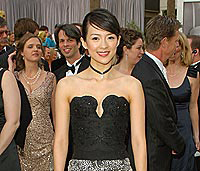
My other moment of TV glory came when the March of the Penguins guys squeezed by
me on their way to the stage to claim the Oscar for Best Documentary. A friend sent me a screen grab of their stuffed penguin whacking me in the head (below) which is framed in my office.
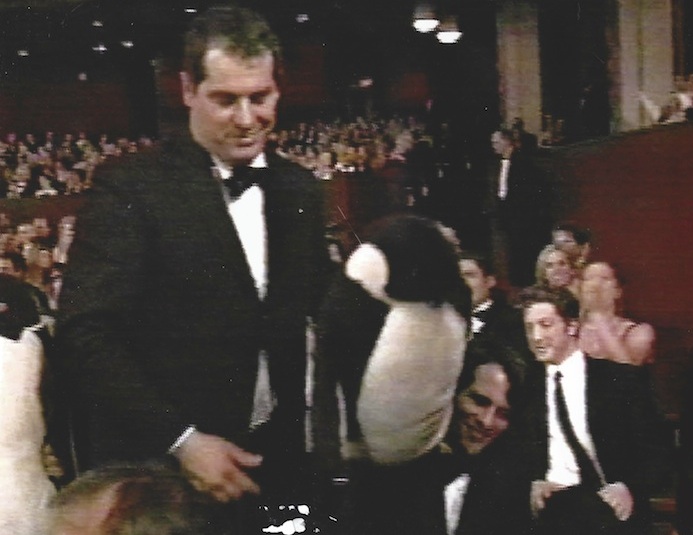
Transcripts of other interviews can be found at:
-Tavis
Smiley Show
-PBS/POV
© 2012 Marshall Curry Productions. All rights reserved.


